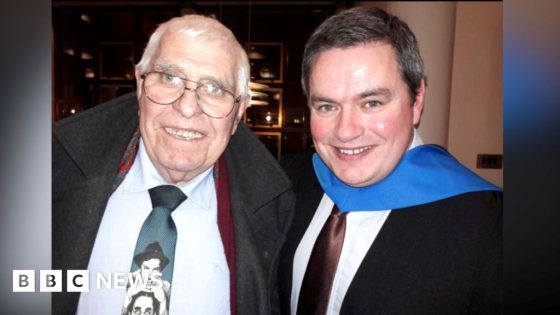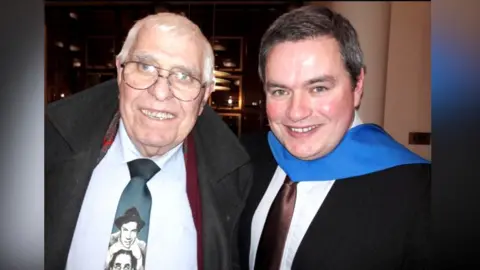 Cull family
Cull family“For daddy to be sent home from hospital and die so suddenly, we knew something wasn’t right.”
Stephen Cull’s father was recovering from bowel cancer surgery in Craigavon Hospital when he was discharged and found dead less than 24 hours later.
Northern Ireland’s health watchdog found serious failures around his care in a damning report that also criticised the hospital’s investigation into what happened.
Meanwhile new figures obtained by BBC News NI show a steady increase in hospital investigations into serious incidents across Northern Ireland, with some taking months or years to complete.
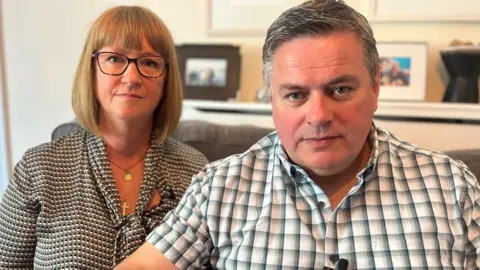 Cull family
Cull familyIt comes as the Northern Ireland Public Service Ombudsman has said such investigations are “simply not working” in too many cases.
A spokesperson for the Southern Health and Social Care Trust said it offered its condolences to the Cull family and is continuing to work on implementing recommendations made by the Northern Ireland Ombudsman.
‘We miss him everyday’
Raphael Cull was 84 years old when his GP noticed a growth on his bowel that was later diagnosed as cancer.
His son Stephen said that, up until that point, his father had barely spent a day in hospital and still loved to travel and cycle.
He said: “My dad was a real character. I suppose Raphael isn’t an overly common name for this part of the world, but he took real pride in being unique.”
Stephen’s wife Melanie also had a strong bond with her father-in-law.
 Cull family
Cull family“He was very mischievous, a real scallywag, but such great fun, we miss him everyday”, she said.
Mr Cull spent a week in hospital recovering from his surgery when staff deemed it safe to discharge him.
His son Stephen said they had raised concerns about his father’s health before he left hospital.
“He wasn’t eating, constantly coughing and burping and was just uncomfortable, but you just put your trust in the medical staff,” he added.
Stephen and Melanie were staying with Mr Cull while he recovered, but in the early hours of the morning, his daughter in law found him dead on the sofa.
 Cull family
Cull family“He mustn’t have been able to sleep and had come downstairs to watch TV and when I found him I knew he was gone,” said Melanie.
“But I had to drag the poor man to the ground and try give him CPR, but it was too late, it was awful, very traumatic.”
A report by the Coroner would find that Mr Cull had died as a result of complications caused by a bowel obstruction and necrosis.
In May 2019 the Cull family would send a letter of complaint to the Southern Trust about a lack of answers around what had happened.
‘Extremely concerning’
In July 2019 the trust confirmed it would carry out a Serious Adverse Incident (SAI) investigation.
It was completed in November 2019, a year after Mr Cull’s death.
It found that Mr Cull’s bloods were inaccurately recorded on the day he was sent home and that his discharge was therefore “inappropriate”.
Stephen Cull said: “Firstly the SAI report took far too long to carry out and wouldn’t have happened if we didn’t chase it and just left us with more questions.”
Mr Cull’s family brought their father’s case to the Northern Ireland Ombudsman’s office.
The ombudsman found a further series failures in Mr Cull’s care and treatment, including a failure to adequately assess Mr Cull before discharge.
The ombudsman concluded that these failings amounted to “a loss of opportunity for the patient, which ultimately led to his untimely death”.
The ombudsman also found failures in the trust’s handling of the family’s complaint and its reporting of a Serious Adverse Incident.
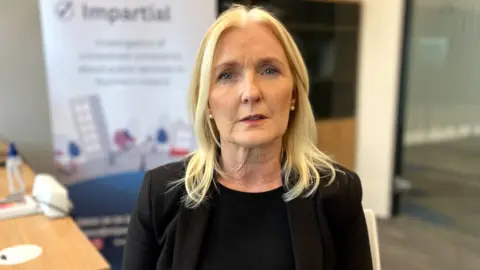
The ombudsman said it was her view that had the family not submitted their complaint, failures in their father’s care would not have come to light and that this was “extremely concerning”.
The ombudsman concluded that the trust failed to carry out a thorough and accurate investigation.
Speaking to BBC News NI, Ombudsman Margaret Kelly, said she was “increasingly worried” about the number of cases coming into her office similar to Mr Cull’s.
She said: “Clearly Mr Cull’s case met the criteria for an SAI and should have been investigated immediately, for the trust not act on that that isn’t good enough.
“In the last 18 months, I have certainly seen more cases of serious harm or death in healthcare settings land on my desk, and that is a cause for concern for my office.”
Figures obtained by BBC News NI showed that SAIs have been steadily increasing in recent years, with more than 2,600 reported between 2019 and 2023.
Unexpected death or severe harm was the most common reason for an SAI during this period.
‘We didn’t want his death to be in vain’
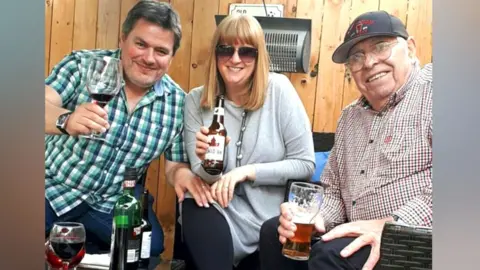 Cull family
Cull familyCommenting on the figures Margaret Kelly said: “With the type of cases my office is seeing I am increasingly of the opinion that SAIs are not working.
“We are seeing patients and families, like Mr Cull’s family, who do not trust that the process is open and honest, and this is happening on too many occasions, so I think the process needs re-looked at, centred around patients and families.”
Following the ombudsman’s investigation into Mr Culls’ case, the Southern Trust provided the family with a written apology.
“We wanted to honour my dad’s life, so that his death wouldn’t be in vain, to raise awareness so that this doesn’t happen to other families,” said Stephen.
The Department of Health said work was ongoing to improve the Serious Adverse Incident review process across Northern Ireland.
A spokesperson added: “While there is undoubtedly also good practice across the HSC in undertaking SAI reviews, there is clear evidence from inquiries and reports that aspects of the current SAI procedure is often not working well for all those involved, and needs to be refreshed and redesigned.”
Source Agencies

